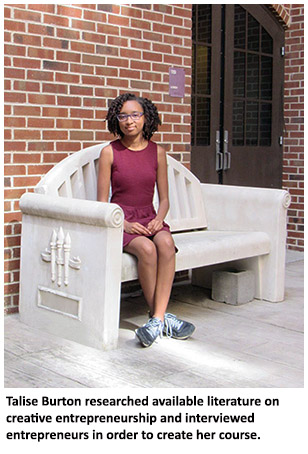Talise Burton: IDEA Grant winner for developing a course on creative entrepreneurship
Undergraduates at Florida State are familiar with the process of scouring course offerings and looking for classes they want to add to their academic schedules. Talise Burton, a senior majoring in English, decided she wanted to build one of those courses for students to consider. And FSU’s Center for Undergraduate Research and Academic Engagement rewarded Burton with an IDEA Grant to help carry out the unconventional plan.
 “It’s unusual for an undergraduate to create a course and ask the university to implement the course,” Burton says.
“It’s unusual for an undergraduate to create a course and ask the university to implement the course,” Burton says.
She worked and researched with Dr. Molly Hand on her project, which is focused on creative entrepreneurship. Hand is the English department’s entrepreneur-in-residence.
“This has been a real exciting time for me and Dr. Hand because the experience is so unique,” Burton says. “For me, it shows I have that growth that many students at this university have, as well as access to the resources to do anything and to create anything. So, previously what was impossible has become possible through the resources and faculty at this school.”
Burton presented her IDEA Grant poster project, “Let’s Feed the Starving Artist: Creative Entrepreneurship Course,” in October 2018 at the President's Showcase for Undergraduate Research Excellence. Burton’s major concentration is creative writing and she is earning a minor in entrepreneurship. Her grant allowed her to research and to establish an FSU Creative Entrepreneurship course that attempts to change negative perceptions and other issues surrounding the relationship between business and creative arts subjects.
Burton was in FSU’s Undergraduate Research Opportunity Program (UROP) in her sophomore year, and she taught a business research course during the 2017-18 academic year to 16 students as a UROP leader.
“Talise and I began talking about this idea in the fall of 2016 when she began working with me as a UROP student,” Hand says. “But Talise took the initial concept and ran with it, developing it on her own and in ways I hadn't imagined. The course she developed is the outcome of her own creative thinking, research, and desire for students in arts and humanities to understand how entrepreneurship can be a valuable part of their professional journeys.”
Burton read through available literature that exists for creative entrepreneurship, determining which texts would be suitable and helpful as course materials for students in the arts and humanities. She also researched course offerings at other institutions and interviewed many creative entrepreneurs in the Tallahassee and Jacksonville communities for her project.
“I talked with them about how they implemented creative entrepreneurship in their own lives and made it valuable to them and their communities,” she says.
Burton then incorporated what she has learned from reading course syllabi throughout her time in college and brought together all of the material to create the course on creative entrepreneurship. Hand says Burton, as an English major in creative writing and an entrepreneurship minor, considered what she would want out of such a course, adding Burton’s “perspective, then, was of a researcher, instructor, and student.”
“This was an ambitious project from the outset, not least because the idea of offering a course on this topic is not at all straightforward, and there aren't a lot of available models to work from,” Hand says. “What does it mean to teach creative entrepreneurship? Who is the audience? What are the course goals? What would the text books or assigned course readings look like? What kinds of assignments or projects would enable students to meet the learning outcomes of the course? Talise had to answer these questions and more throughout her research.
“Her global thinking about the course topic led her to assemble an innovative syllabus that has the makings of a truly meaningful, beneficial course offering.”
Burton says her success would not have been possible without Hand’s guidance.
“Her support and the effort she put into providing the resources necessary for me to create this project has been—I don’t even know how to describe it—indispensible,” Burton says. “I really appreciate the work that Dr. Hand has put into developing me personally, but also developing this work alongside me.”
In addition to her work on the IDEA Grant, Burton also has authored the comic Empress, which was published in the 2018 edition of the Kudzu Review. Burton is an honors student, she has been a marketing intern at the FSU Center for Leadership and Social Change, and a past Career Center ePortolio contest winner.

